A simple ritual that takes less than two minutes could have life-changing health benefits. Naturopathic Doctor Mac Toohey, known online as Dr. Mac, has stated that she maintains a popular habit after every single meal to protect herself from serious health issues. In a TikTok video viewed nearly 70,000 times, she highlighted that oral health impacts far more than people’s smiles. Oral health is typically overlooked, but it is actually related to a lot of serious health concerns Image credits: Doctor Mac According to the American Dental Association, flossing should be done at least once a day, yet surveys show only 32% of Americans follow this advice, according to the New York Post. Another 32% of the same study’s respondents admitted that they never floss at all. Dr. Mac stated that this is a dangerous oversight because bacteria that causes gum disease or gingivitis do not just stay in the mouth. Image credits: Unsplash / Jordan González They can enter the bloodstream and reach other organs, triggering serious health problems. “If you see me flossing after every meal, it’s because I am terrified of having a heart attack and terrified of getting dementia when I’m older,” Dr. Mac said in her TIkTok video. In 2019, scientists at the Broegelmanns Research Laboratory in Norway’s University of Bergen found DNA evidence that “bacteria causing gingivitis can move from the mouth to the brain.” Image credits: TikTok / drtoohey Once there, the bacteria can release a protein that destroys brain cells, contributing to memory loss and dementia. The study involved 53 people with Alzheimer’s, 96% of whom tested positive for the destructive enzyme. Chia-Shu Lin, a professor of dentistry at the National Yang Ming Chiao Tung University in Taiwan, stated that it’s high time the public puts a lot of attention to their oral health. Image credits: Unsplash / Natali Hordiiuk “The public needs to be more aware of the correlation between oral health and cognitive abilities,” the professor stated. Flossing can help keep the heart healthy, and it helps reduce stroke risks, too Heart health is also closely linked to gum health. People with gum disease are 28% more likely to suffer a heart attack, according to medical studies. @drtoohey flossing isn’t just about saving your smile — it’s about saving your heart and mind too #dementia #dementiaawareness #brainhealth #healthyheart #holistichealing ♬ original sound – Dr. Mac Gastroenterologist Dr. Saurabh Sethi explained that good brushing and flossing habits, along with regular dental checkups, are tied to healthier hearts and reduced cardiovascular risk. “Studies show that people who brush their teeth regularly, along with getting dental cleanings, tend to have healthier hearts and a lower risk of heart disease,” Dr. Sethi said. Good oral health habits can also influence stroke risk. Image credits: TikTok / drtoohey A recent study found that flossing at least once a week is linked to a 22% lower risk of ischemic stroke, a 44% lower risk of cardioembolic stroke, and a 12% lower risk of atrial fibrillation. “Oral health behaviors are linked to inflammation and artery hardening. Flossing may reduce stroke risk by lowering oral infections and inflammation and encouraging other healthy habits,” said lead author Dr. Souvik Sen. Dr. Sen also noted that flossing is inexpensive and easy to do, making it one of the most accessible preventive measures available. Image credits: Unsplash / Jair Lázaro “Many people have expressed that dental care is costly. Flossing is a healthy habit that is easy to adopt, affordable and accessible everywhere,” Dr. Sen said. Recent research has also linking gum bacteria to certain cancers, including head and neck cancers. For Dr. Mac, that’s one more reason to keep dental floss within reach at all times. “It might seem crazy that flossing could have such an enormous health impact,” she admitted, but it “makes sense because everything’s connected.” Dr. Mac’s advice has received varied responses from netizens Image credits: Unsplash / Josue Michel While Dr. Mac’s advice has been received warmly by numerous netizens, some have stated that it’s high time for healthcare insurance providers to include dental care in their policies. “If science backs up this article, then maybe it’s time for medical insurance providers to include eyesight, hearing aids, and dental care in our policies. As far as I know, eyes, ears and teeth are body parts,” one commenter wrote. “And yet dental isn’t considered health care, and you have to have a separate policy for it, which most people can afford!” Wrote another. Others, however, simply appreciated Dr. Mac’s advice. Image credits: Unsplash / Kateryna Hliznitsova “This is such useful information! Sometimes just a small habit after meals can help prevent serious conditions like heart attacks, strokes, or dementia. Definitely worth trying to protect our long-term health,” wrote one commenter. “When I was in school for dental assisting, one of my teachers was an oral surgeon and he told us one of the leading causes of heart disease is gum disease and if people simply flossed after eating a meal, it reduces the risk greatly. So while she may seem silly, it’s true,” another wrote. Netizens weighed in on Dr. Mac’s oral advice on social media Doctor Reveals Tiny Habit That Could Help Prevent Heart Attack and Dementia
A simple ritual that takes less than two minutes could have life-changing health benefits.
Naturopathic Doctor Mac Toohey, known online as Dr. Mac, has stated that she maintains a popular habit after every single meal to protect herself from serious health issues.
In a TikTok video viewed nearly 70,000 times, she highlighted that oral health impacts far more than people’s smiles.
Oral health is typically overlooked, but it is actually related to a lot of serious health concerns
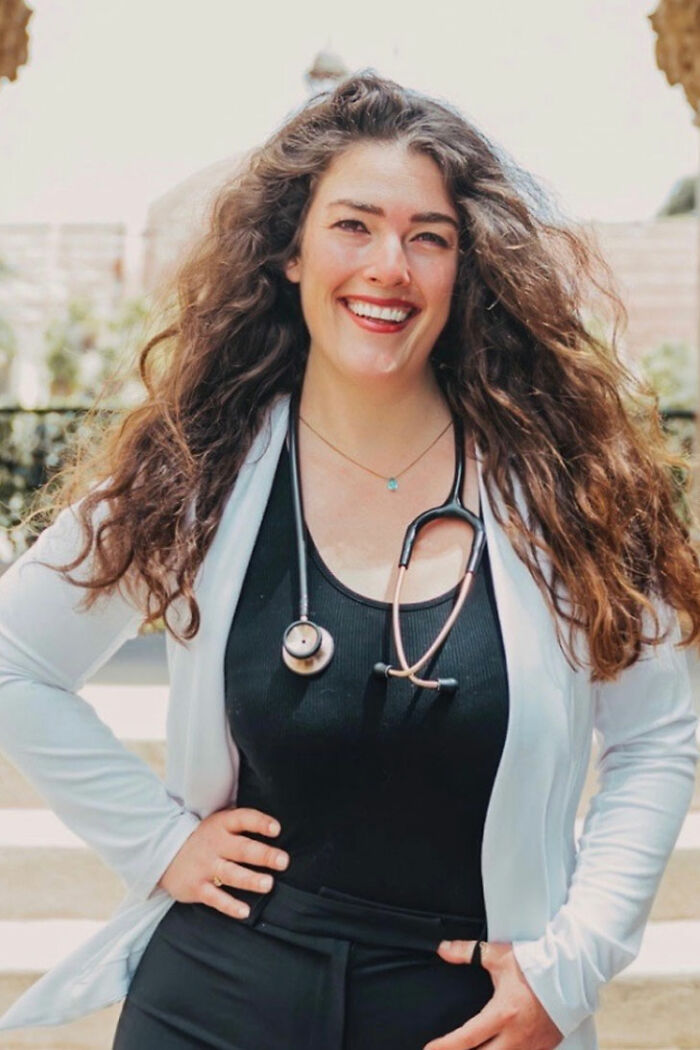
Image credits: Doctor Mac
According to the American Dental Association, flossing should be done at least once a day, yet surveys show only 32% of Americans follow this advice, according to the New York Post.
Another 32% of the same study’s respondents admitted that they never floss at all.
Dr. Mac stated that this is a dangerous oversight because bacteria that causes gum disease or gingivitis do not just stay in the mouth.
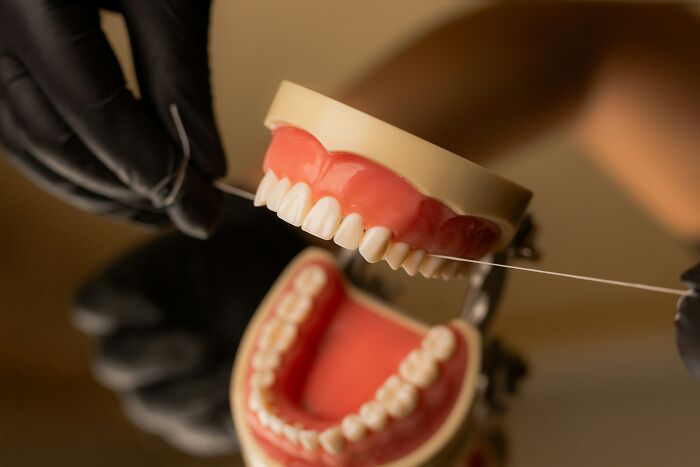
Image credits: Unsplash / Jordan González
They can enter the bloodstream and reach other organs, triggering serious health problems.
“If you see me flossing after every meal, it’s because I am terrified of having a heart attack and terrified of getting dementia when I’m older,” Dr. Mac said in her TIkTok video.
In 2019, scientists at the Broegelmanns Research Laboratory in Norway’s University of Bergen found DNA evidence that “bacteria causing gingivitis can move from the mouth to the brain.”

Image credits: TikTok / drtoohey
Once there, the bacteria can release a protein that destroys brain cells, contributing to memory loss and dementia.
The study involved 53 people with Alzheimer’s, 96% of whom tested positive for the destructive enzyme.
Chia-Shu Lin, a professor of dentistry at the National Yang Ming Chiao Tung University in Taiwan, stated that it’s high time the public puts a lot of attention to their oral health.

Image credits: Unsplash / Natali Hordiiuk
“The public needs to be more aware of the correlation between oral health and cognitive abilities,” the professor stated.
Flossing can help keep the heart healthy, and it helps reduce stroke risks, too
Heart health is also closely linked to gum health. People with gum disease are 28% more likely to suffer a heart attack, according to medical studies.
@drtoohey flossing isn’t just about saving your smile — it’s about saving your heart and mind too #dementia #dementiaawareness #brainhealth #healthyheart #holistichealing ♬ original sound – Dr. Mac
Gastroenterologist Dr. Saurabh Sethi explained that good brushing and flossing habits, along with regular dental checkups, are tied to healthier hearts and reduced cardiovascular risk.
“Studies show that people who brush their teeth regularly, along with getting dental cleanings, tend to have healthier hearts and a lower risk of heart disease,” Dr. Sethi said.
Good oral health habits can also influence stroke risk.

Image credits: TikTok / drtoohey
A recent study found that flossing at least once a week is linked to a 22% lower risk of ischemic stroke, a 44% lower risk of cardioembolic stroke, and a 12% lower risk of atrial fibrillation.
“Oral health behaviors are linked to inflammation and artery hardening. Flossing may reduce stroke risk by lowering oral infections and inflammation and encouraging other healthy habits,” said lead author Dr. Souvik Sen.
Dr. Sen also noted that flossing is inexpensive and easy to do, making it one of the most accessible preventive measures available.

Image credits: Unsplash / Jair Lázaro
“Many people have expressed that dental care is costly. Flossing is a healthy habit that is easy to adopt, affordable and accessible everywhere,” Dr. Sen said.
Recent research has also linking gum bacteria to certain cancers, including head and neck cancers. For Dr. Mac, that’s one more reason to keep dental floss within reach at all times.
“It might seem crazy that flossing could have such an enormous health impact,” she admitted, but it “makes sense because everything’s connected.”
Dr. Mac’s advice has received varied responses from netizens

Image credits: Unsplash / Josue Michel
While Dr. Mac’s advice has been received warmly by numerous netizens, some have stated that it’s high time for healthcare insurance providers to include dental care in their policies.
“If science backs up this article, then maybe it’s time for medical insurance providers to include eyesight, hearing aids, and dental care in our policies. As far as I know, eyes, ears and teeth are body parts,” one commenter wrote.
“And yet dental isn’t considered health care, and you have to have a separate policy for it, which most people can afford!” Wrote another.
Others, however, simply appreciated Dr. Mac’s advice.
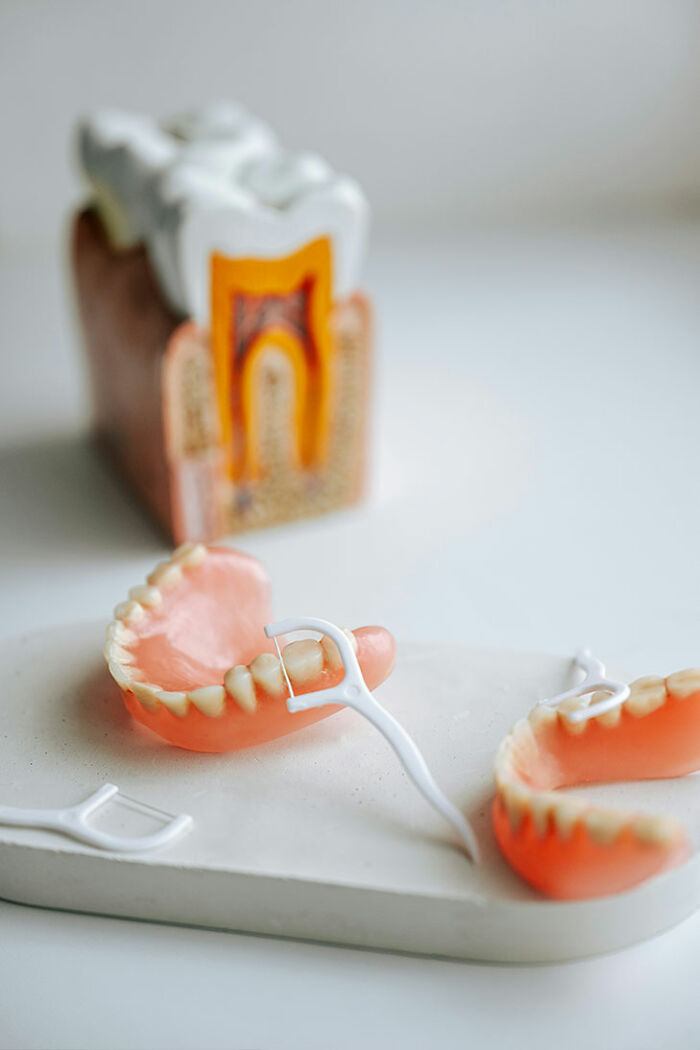
Image credits: Unsplash / Kateryna Hliznitsova
“This is such useful information! Sometimes just a small habit after meals can help prevent serious conditions like heart attacks, strokes, or dementia. Definitely worth trying to protect our long-term health,” wrote one commenter.
“When I was in school for dental assisting, one of my teachers was an oral surgeon and he told us one of the leading causes of heart disease is gum disease and if people simply flossed after eating a meal, it reduces the risk greatly. So while she may seem silly, it’s true,” another wrote.
Netizens weighed in on Dr. Mac’s oral advice on social media










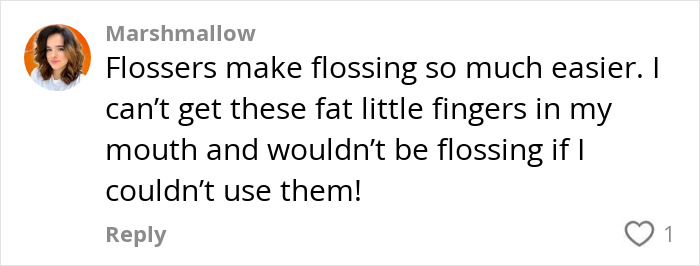


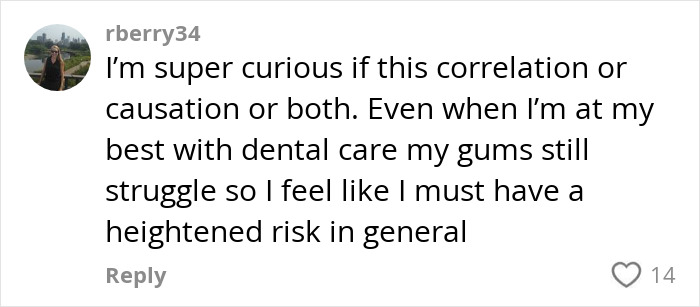
from Bored Panda https://ift.tt/6jBqTx1




No comments: